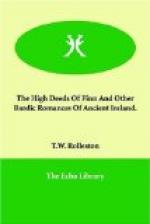who is a land hero, in one of the versions of his
death, dies fighting the sea-waves. The sound,
the restlessness, the calm, the savour and the infinite
of the sea, live in a host of these stories; and to
cap all, the sea itself and Mananan its god sympathise
with the fates of Erin. When great trouble threatens
Ireland, or one of her heroes is near death, there
are three huge waves which, at three different points,
rise, roaring, out of the ocean, and roll, flooding
every creek and bay and cave and river round the whole
coast with tidings of sorrow and doom. Later on,
in the Fenian tales, the sea is not so prominent.
Finn and his clan are more concerned with the land.
Their work, their hunting and adventures carry them
over the mountains and plains, through the forests,
and by the lakes and rivers. In the stories there
is scarcely any part of Ireland which is not linked,
almost geographically, with its scenery. Even
the ancient gods have retired from the coast to live
in the pleasant green hills or by the wooded shores
of the great lakes or in hearing of the soft murmur
of the rivers. This business of the sea, this
varied aspect of the land, crept into the imagination
of the Irish, and were used by them to embroider and
adorn their poems and tales. They do not care
as much for the doings of the sky. There does
not seem to be any supreme god of the heaven in their
mythology. Neither the sun nor the moon are specially
worshipped. There are sun-heroes like Lugh, but
no isolated sun-god. The great beauty of the
cloud-tragedies of storm, the gorgeous sunrises and
sunsets, so dramatic in Ireland, or the magnificence
of the starry heavens, are scarcely celebrated.
But the Irish folk have heard the sound of the wind
in the tree-tops and marked its cold swiftness over
the moor, and watched with fear or love the mists
of ocean and the bewilderment of the storm-driven
snow and the sweet falling of the dew. These are
fully celebrated.
These great and small aspects of Nature are not only
celebrated, they are loved. One cannot read the
stories in this book without feeling that the people
who conceived and made them observed Nature and her
ways with a careful affection, which seems to be more
developed in the Celtic folk than elsewhere in modern
Europe. There is nothing which resembles it in
Teutonic story-telling. In the story of The
Children of Lir, though there is no set description
of scenery, we feel the spirit of the landscape by
the lake where Lir listened for three hundred years
to the sweet songs of his children. And, as we
read of their future fate, we are filled with the
solitude and mystery, the ruthlessness and beauty
of the ocean. Even its gentleness on quiet days
enters from the tale into our imagination. Then,
too, the mountain-glory and the mountain-gloom are
again and again imaginatively described and loved.
The windings and recesses, the darkness and brightness
of the woods and the glades therein, enchant the Fenians




